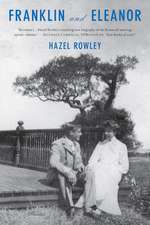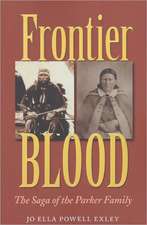A Way of Work and a Way of Life: Coal Mining in Thurber, Texas, 1888-1926: Texas A&m Southwestern Studies, cartea 9
Autor Marilyn D. Rhineharten Limba Engleză Paperback – 29 feb 1992
In 1888 Robert D. Hunter and the Texas & Pacific Coal Company founded the town of Thurber on the site of Johnson Mines, a small coal-mining village on the western edge of North Central Texas where Palo Pinto, Erath, and Eastland counties converged. William Whipple and Harvey E. Johnson first established a small community there in 1886 as the railroads' demand for coal enhanced the possibility of financial reward for entrepreneurs willing to risk the effort to tap the thin bituminous coal veins that lay beneath the ground. Where the first comers failed, Hunter and his stockholders prevailed. For almost forty years the company mined coal and owned and operated a town that by 1910 served as home to more than three thousand residents.
In some respects, the town mirrored the work and culture of bituminous coal-mining communities throughout the United States. Like most, it experienced labor upheaval that reached a dramatic climax in 1903 when the United Mine Workers, emboldened and strengthened by successes in other parts of the Southwest, organized Thurber's miners. Unlike others, however, the miners' success at Thurber was not fraught with violence and loss of life; furthermore, in the strike's aftermath good relations generally characterized employer/employee negotiations.
Marilyn Rhinehart examines the culture of the miners' work, the demographics and social life of the community, and the benefits and constraints of life in a company town. Above all she demonstrates the features both at work and after work of a culture shaped by the occupation of coal mining.
Preț: 180.16 lei
Nou
Puncte Express: 270
Preț estimativ în valută:
34.47€ • 37.56$ • 29.05£
34.47€ • 37.56$ • 29.05£
Carte tipărită la comandă
Livrare economică 23 aprilie-07 mai
Preluare comenzi: 021 569.72.76
Specificații
ISBN-13: 9781585445394
ISBN-10: 1585445398
Pagini: 188
Dimensiuni: 152 x 229 x 11 mm
Greutate: 0.28 kg
Ediția:Revised
Editura: Texas A&M University Press
Seriile TEXAS A.& M.SOUTHWESTERN STUDIES, Texas A&m Southwestern Studies
ISBN-10: 1585445398
Pagini: 188
Dimensiuni: 152 x 229 x 11 mm
Greutate: 0.28 kg
Ediția:Revised
Editura: Texas A&M University Press
Seriile TEXAS A.& M.SOUTHWESTERN STUDIES, Texas A&m Southwestern Studies
Textul de pe ultima copertă
The coal mine represented much more than a way of making a living to the miners of Thurber, Texas, in the late nineteenth and early twentieth centuries--it represented a way of life. Coal mining dominated Thurber's work life, and miners dominated its social life. The large immigrant population that filled the mines in Thurber had arrived from more than a dozen nations, which lent a certain distinctiveness to this Texas town. In 1888 Robert D. Hunter and the Texas & Pacific Coal Company founded the town of Thurber on the site of Johnson Mines, a small coalmining village on the western edge of North Central Texas where Palo Pinto, Erath, and Eastland counties converged. William Whipple and Harvey E. Johnson first established a small community there in 1886 as the railroads' demand for coal enhanced the possibility of financial reward for entrepreneurs willing to risk the effort to tap the thin bituminous coal veins that lay beneath the ground. Where the first comers failed, Hunter and his stockholders prevailed. For almost forty years the company mined coal and owned and operated a town that by 1910 served as home to more than three thousand residents. In some respects, the town mirrored the work and culture of bituminous coal mining communities throughout the United States. Like most, it experienced labor upheaval that reached a dramatic climax in 1903 when the United Mine Workers, emboldened and strengthened by successes in other parts of the Southwest, organized Thurber's miners. Unlike elsewhere, however, the miners' success at Thurber was not fraught with violence and loss of life; furthermore, in the strike's aftermath good relations generally characterized employer/employeenegotiations. Marilyn Rhinehart examines the culture of the miners' work, the demographics and social life of the community, and the benefits and constraints of life in a company town. Above all she demonstrates the features both at work and after work of a culture shaped by the occupation of coal mining.
Notă biografică
Marilyn D. Rhinehart is a member of the full-time history faculty and chair of the Social Sciences Division College at North Harris College in Houston, Texas. She received her Ph.D. in American history from the University of Houston. Her special fields of interest include American labor history, Texas history, and American history in the Gilded Age and the Progressive era. She has written a number of articles on labor and politics.











